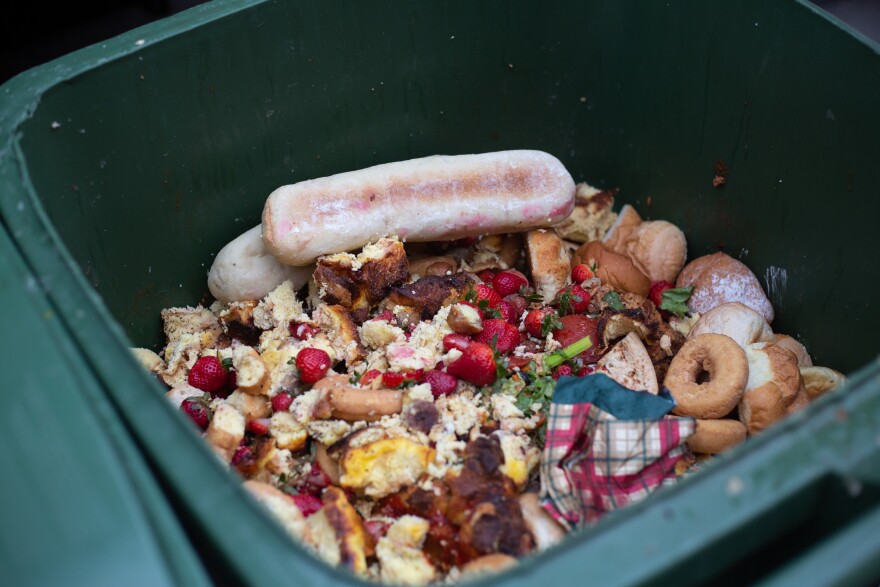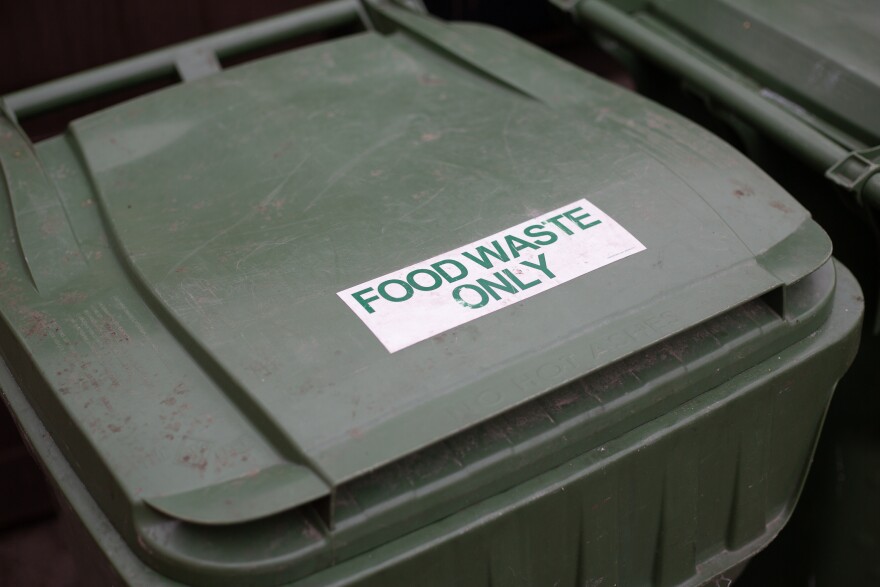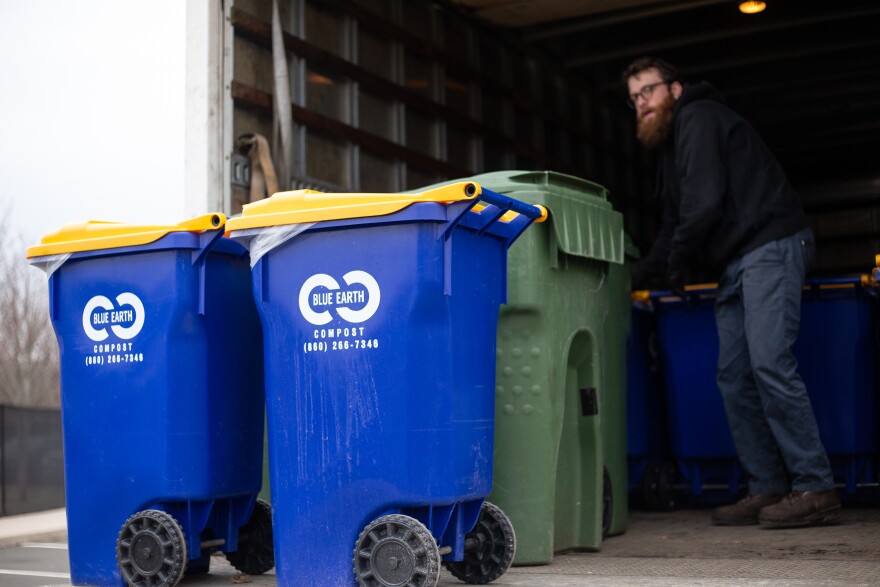Americans throw out lots of food. Estimates from the EPA say nearly 40 million tons are landfilled or incinerated each year. And in Connecticut, food waste is second only to paper in terms of what people toss in the trash.
So more than five years ago, a new state law began requiring large businesses to recycle their leftover food. The hope was to divert organic waste from the trash bin while enticing recyclers to build in the state.
But getting that recycling industry started has been a challenge.
Alex Williams is the owner and operator of Blue Earth Compost, which is a six person business that travels all over Connecticut transporting old food scraps.
As he maneuvered his 24-foot box truck through the congested asphalt parking lots that city trash dumpsters call home, he described what his company picks up.
“A little bit of everything. From meat scraps, bones … all the way to veggie scraps. Fruit scraps. Coffee grounds. Bread,” Williams said. “The saying that we use is, ‘if it grows, it goes.’”
Williams said food waste is, potentially, recycling’s next big thing. Keeping food out of landfills reduces harmful methane emissions. It can potentially lower your garbage bill because you’re putting less stuff in the bin. And, he said, it’s just a more sustainable way to recycle.
“The difference with food waste recycling is you’re not going to barge your food waste to China to have it composted or something like that. It just doesn’t work that way,” Williams said. “It has to be processed locally.”

Food in Connecticut is recycled two ways. One option is to turn it into compost. But to take in waste, you need a lot of permits.
It can also be turned into renewable energy. Except right now, there’s only one place in the state that can do that.
So to jumpstart the food waste recycling industry, in 2014, Connecticut’s legislature enacted a law. It requires businesses producing lots of food waste to recycle it, if they’re within 20 miles of a facility that’s licensed to handle it.
“Certainly, I think the law was envisioned as a ‘build it and they will come’ type of law,” said Chris Nelson with the Department of Energy and Environmental Protection. “Where if we put the driver there for people to separate their food waste, that the infrastructure would come in.”
Nelson said the 2014 law produced a flurry of interest.
DEEP quickly signed off on four permit applications for anaerobic digesters, which are big food-to-energy plants that can turn thousands of tons of old food into renewable biogas or electricity.
But then, momentum stalled.
“Only one facility, Quantum Biopower in Southington, is up and operational at this time,” Nelson said. “The other three facilities are still working through either some site issues or getting the finances in line for the project.”
One of those facilities is Turning Earth. For almost a decade, it’s been trying to build an anaerobic digester along the I-84/91 corridor, where there are lots of potential customers.
“The organics diversion law was fantastic in terms of ensuring that organic feedstock would be there. That the state was behind these projects,” said Amy McCrae Kessler, a lawyer and founder at Turning Earth.
But, she said, lawmakers did a bad job at addressing what goes out the door: renewable energy.
“It’s very difficult to sell your renewable electricity for prices that make the projects pencil out,” McCrae Kessler said. “The opportunities in Connecticut are few and far between to do that.”
Other states like Massachusetts offer deals for organic recyclers.
Those deals include grants to get projects started or generous pricing arrangements, which spur investment and make renewable power more competitive with cheap natural gas.

Then there’s the Connecticut Green Bank, which gave Turning Earth a $4.5 million loan. McCrae Kessler said that boosted the confidence of investors worried about how Turning Earth would sell its power.
But last session lawmakers raided the Green Bank’s money to plug up the state’s budget deficit.
“They had to rescind our loan commitment. And loss of that … has been a significant barrier or obstacle for us to overcome,” McCrae Kessler said. “We’re competing for equity and debt dollars with projects in other states that are being backed by Green Banks.”
Turning Earth said it’s now considering selling its biogas to California. Where McCrae Kessler said low-carbon fuel standards could finally make the math work out.

Back on the truck in Hartford, Blue Earth’s Alex Williams said demand for food waste recycling is there. Homeowners, some public schools, and universities are volunteering to do it. And he said he’s grown his company to nearly 400 clients, despite a lack of infrastructure.
“Our hope is once those things start to catch up to what we’re doing, that we’ll be able to capitalize on the hard work that we’ve put in so far,” Williams said.
And pretty soon, there’s going to be more waste up for grabs.
Connecticut’s diversion standards change next year to require more businesses to divert their food.
But the question remains, will any new companies pop up to recycle it?





